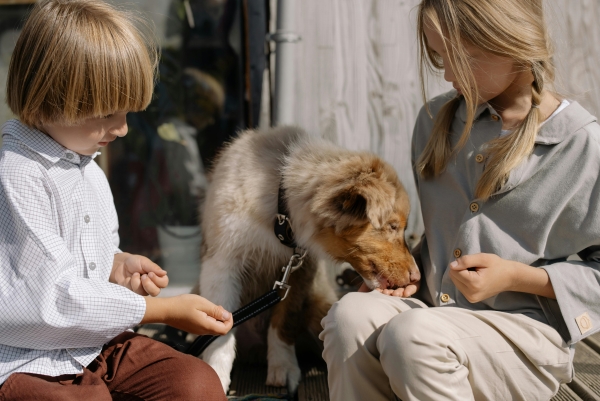Adopting a Senior Pet
What Age is Considered a Senior Pet?
Thanks to improved veterinary care and nutrition, pets are living longer, which means that when you look for your next companion, they might be older than you expected. Generally, pets aged 5 to 7 years and older are considered senior pets. Unfortunately, senior pets make up a large portion of animal shelters because potential adopters often overlook them, thinking that senior pets must have significant health or behavioral problems. This is a misconception because senior pets can bring many benefits to you and your family, and giving them a forever home offers them a second chance at love.
While age itself is not a disease, it can come with various conditions that potential adopters should be aware of before making this important commitment. The benefits of senior pets include being already house-trained, socialized, and having established temperaments. However, they are more likely to experience health-related conditions, and the time you spend with them may, unfortunately, be shorter than expected.
How to Prepare for a Senior Pet?
Congratulations on giving a senior pet a second chance. Providing a loving forever home to a senior pet not only offers them a new lease on life but also opens your heart to a wealth of love and affection in return. Adapting to a new environment can sometimes be challenging, but don’t worry. By following some simple tips and preparing in advance, you can make the adjustment smoother.
Before providing a senior pet with a comfortable and loving home, make sure to discuss the following with shelter staff:
– What is the pet’s age (or best guess)?
– Why is the pet in the shelter (owner surrender, lost/stray, confiscation, etc.)?
– Past medical history, including any diagnoses and treatments
– Current medical history, including any additional identified conditions
– Current behavior and temperament analysis (Is the pet good with children, other pets, etc.?)
– Is the pet house-trained, crate-trained, leash-trained, etc.?
– Does the pet know any tricks, and if so, which ones?
– Are there any low-cost testing options, coupons, or discounted medical care to help with future expenses?
– What is the pet’s special diet? How much food and at what times? If the special diet is unavailable, what are the alternative options?
Senior pets are more likely to experience arthritis, sensory (such as vision and hearing) decline, and cognitive decline. Therefore, slight environmental changes can significantly impact their physical and emotional health, including:
– Mattresses: Reduce pressure on aging bones and joints. Orthopedic beds are excellent additions.
– Ramps, toe grips, carpets: Increase traction and reduce the risk of slipping and falling.
– Elevated food and water bowls: Prevent excessive bending while eating and drinking, reducing pain.
– Larger, walk-in litter boxes: Make entry easier and reduce stress on aging joints.
– Night lights: Help with declining vision.
– Harness support: Ease the stress of lifting the dog up stairs or into the car.
– Supplements: Such as Senilife® (brain health), Dasuquin® (joint care), or Denamarin® (liver health).
– Environmental enrichment: Use food puzzles, as senior pets may not be as active as they once were.
– Consistency/routine and minimal changes to or addition of furniture: Make it easier for the pet to move around and navigate the home.
Senior Pet Diet
Since senior pets often lose muscle and have a slower metabolism, a senior diet is usually recommended. These diets are designed to help preserve protein and maintain a healthy weight. Royal Canin® offers mobility-support diets for senior pets.
Senior foods contain fats and antioxidants, such as vitamin E and carotenoids, which can help slow nerve damage and provide additional energy sources. Pets with certain medical conditions, such as urinary stones or kidney disease, might be prescribed specific diets to help manage these conditions.
As senior pets may also experience a decline in taste, enhancing their food’s flavor by heating it or adding canned food can be beneficial. Choosing the right diet is a great topic to discuss during your first vet visit.
After the vet reviews the shelter records, you should ask the vet the following questions:
– What diet should my pet follow, and how much should they eat?
– Should they take any supplements or medications? If so, what is the frequency of follow-up care and check-ups?
– What kind and amount of exercise should be provided daily?
– What tests should be conducted today? (Blood, urine, and fecal tests, as well as X-rays, may be suggested to screen for hormone imbalances, ensure kidney and liver function, or determine the extent of arthritis.)
– How often should they come in for routine checks and exams? Most senior pets are recommended to have at least annual blood tests, if not more frequently, depending on the medication type.
Expectations of Adopting a Senior Pet
There are many factors to consider when adopting a senior pet, including numerous benefits. Their temperament and health status are often clear, making it easier to know if they will get along with your other pets or children.
They tend to require less training since they may already be house-trained, crate-trained, and trained in other areas (like fetching). They may also know various tricks like sit, stay, and roll over. You will also avoid the challenging and time-consuming puppy stage, including multiple nighttime bathroom breaks. Remember, senior dogs can be great companions for those with more sedentary lifestyles.
When considering adopting a senior pet, it’s important to understand that their time with you may be shorter than expected. Additionally, most health-related conditions they experience are manageable, meaning there might not be a cure, but medications or supplements can manage side effects or treat symptoms related to the condition.
Besides graying fur or stiffness while walking, common health issues in senior pets include:
– Arthritis
– Cancer
– Cognitive dysfunction (similar to Alzheimer’s in humans) and anxiety
– Dental disease
– Endocrine diseases, such as hypothyroidism and liver and kidney diseases
– Loss of vision, hearing, and taste
– Lumps and bumps
Even if your pet does not currently have any of these issues, regular vet check-ups can help identify and manage these conditions, improving their quality of life in the long term.
Long-Term Management of Senior Pets
To make the most of your pet’s golden years, it’s advisable to work with your vet to establish a schedule for regular check-ups. This not only ensures your pet’s comfort and overall quality of life but also allows for necessary blood tests and other diagnostics as needed. Senior pets may require long-term chronic medication and supplements, necessitating frequent check-ups to ensure organs are not harmed and to monitor the effectiveness of the medications.
With frequent medical care, environmental enrichment, comfortable living conditions, and your increased vigilance and care, you can rest assured knowing that your senior pet will enjoy their best years in a comfortable and loving home.





